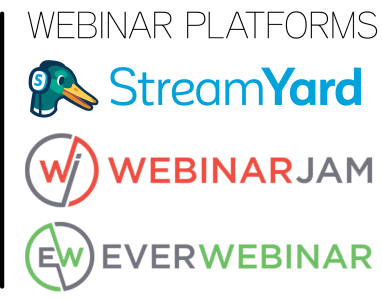Creating webinars can be a great way for real estate professionals to showcase expertise in their market and the industry as a whole
By Regina Ludes
Sven Andersen, CRS, used to host eight in-person seminars a year.
When the pandemic shut them down last year, the CEO of Andersen Group Realty in Winchester, Massachusetts, knew he had to try something different. “I decided I wanted to offer online webinars that would reflect what was happening in the housing market,” he recalls.
The result was a series of webinars focused on four distinct market niches: first-time buyers, move-up buyers, investors and sellers. The webinars rotate weekly, so each niche is highlighted once a month. At roughly a quarter of the cost of the in-person seminars, the webinars have expanded his audience and generated more and higher-quality leads for his real estate business, Andersen says.
According to On24 Webinar Benchmarks Report 2021, 72% of businesses surveyed say webinars have a direct impact on their customer pipeline and revenue, and 89% believe webinars outperform other digital channels in creating qualified sales leads. Andersen can attest to the success of his own webinars. As of September 2021, he has hosted 36 webinars at a total cost of $7,800, resulting in 600 qualified leads compared to $20,000 annual expense for eight seminars he presented in 2019.
Webinar Marketing Snapshot
The number of webinars offered globally in 2020 grew 162%, and attendance increased to more than 60 million people, according to On24 Webinar Benchmarks Report 2021, which analyzed the digital experiences of its customers. Other key findings:
- 59% planned to increase the number of webinars they host in 2021.
- 72% say webinars have a direct impact on their customer pipeline and revenue.
- 89% believe webinars outperform other digital channels in creating qualified sales leads.
- 86% say Q&A is the most important engagement tool, followed by resources for download (70%).
- 36% have bought new equipment for their webinars in the past year.
- 57% create webinars that go straight to on-demand viewing.
Though webinars have been in existence since 1996, they surged in popularity in 2020 as REALTORS® like Andersen sought ways to engage with clients during the pandemic. Agents who have produced webinars say they’re able to showcase their expertise to wider audiences. In return, the webinars have improved brand awareness and generated better leads. While there is an initial investment of time and money, once the systems and strategy are in place, webinars can become a valuable addition to an agent’s marketing mix.
With the following guide and insights from several CRS agents, you can get started with your own webinar program.
Find the right topic
First, set a goal for your webinars. Know what you want to accomplish and who your target audience will be. Then find topics that appeal to them.
For inspiration, Marki Lemons Ryhal, CRS, a keynote speaker in Chicago, researches trending topics on Google, Facebook and Instagram, which she uses to create a title, description and learning objectives. “The topics are based on subjects that people are searching for, not on what I think is important,” explains Ryhal, who offered 125 webinars last year.
Leigh Brown, CRS, broker/owner for One Community Real Estate in Concord, North Carolina, who speaks on national real estate topics, says she taps into her knowledge and experience as a REALTOR® for most ideas. Audience members offer suggestions, too. “When they ask questions, I might build a webinar off them,” Brown says.
Decide on a format
Once you’ve determined the topic, you’ll need to decide how to present it, whether as a traditional lecture, interview or panel discussion. Brown primarily uses online lectures, while Andersen shares the stage with a lender and attorney who provide different perspectives on a chosen topic. Ryhal has done both lectures and panels.
“As a panel host, I’ll ask each speaker the question before I answer it myself. For a 25-minute discussion, I may ask only three questions, but each speaker has two minutes to answer each one,” she explains.
Assess technical needs
Of course, you may need to acquire some equipment, such as a webcam, lighting, microphone and webinar platform. Brown says agents should budget $1,000 to cover initial costs. While there are cheaper options available, Brown opted for mid-level equipment that offered professional-quality sound without the cost of a professional studio.
A hard-wired internet connection is a must because some wireless connections can drop on occasion, she adds.
Ryhal agrees that an external audio mic and proper lighting are important. “Audio is important because many of my webinars are repurposed into podcast episodes.” She carries at least two of each piece of equipment, so she has a backup in case one doesn’t work.
You don’t have to be a technical wizard to start producing webinars either, adds Ryhal, who taught herself by watching YouTube videos. “It’s not the experience with technology that matters, but the commitment to learn how to create webinars,” Ryhal says.
Choose a webinar platform
Choosing the right platform for your webinars may be the most difficult decision you’ll make because there are so many options. What you select will depend on audience size and how and where you plan to host the events.
Brown uses Streamyard, which allows her to stream live across several social media platforms at the same time, including YouTube, Facebook and LinkedIn. She records the event for later sharing on social media. She also likes the platform’s capability to compile viewer comments from different host sites, so she can read them in one place.
Ryhal prefers Zoom because most people are familiar with the platform, and it’s frequently updated. She also likes its virtual makeup feature, which allows her to record without the need to put on makeup.
Each of Andersen’s webinars is produced using Webinarjam and Everwebinar, which makes production run smoothly. In addition to ease of use and pricing, Webinarjam sends out automated reminders to registrants and maintains their contact information, so Andersen and his team can access it later for follow up.
Produce and promote the event
All three agents say they promote their webinars via email and social media. In addition, Andersen shares the information on a local community page on Patch.com and on his Just Listed postcards. He promotes the events exclusively to clients and his sphere of influence because they’re more likely to generate better-qualified leads.
 There’s no date or time on his webinars, and he avoids details such as prevailing interest rates, which might date the information. This allows for a longer shelf life, he explains. He refers to the notes that accompany his slide presentation, which is adapted from his in-person events, and has never used a script. He concludes each webinar by inviting viewers to call for more information.
There’s no date or time on his webinars, and he avoids details such as prevailing interest rates, which might date the information. This allows for a longer shelf life, he explains. He refers to the notes that accompany his slide presentation, which is adapted from his in-person events, and has never used a script. He concludes each webinar by inviting viewers to call for more information.
For newcomers, it’s natural to be hesitant in your delivery, so it’s recommended to practice the presentation or do a rehearsal before going live. Avoid using a script, or the presentation will sound stiff and formal. You want to appear natural, as if you’re having a conversation with your audience. “People don’t care about fancy appearances; they want engagement,” Ryhal says.
Measure results
Andersen measures success by how many viewers convert to customers. When someone registers for an event, a team member will contact them using the Webinarjam registration data. “Without proper follow-up, doing webinars does not make sense,” he says.
For long-term success, be consistent with producing and promoting your webinar program—this isn’t a one-and-done deal. Look for ways to repurpose the content. Ryhal, for example, converts her webinars into podcast episodes that can be accessed on her website. “There’s no such thing as a one-hit webinar wonder,” Ryhal says.
While webinars aren’t for everyone, with proper planning and a strategic mindset, they can become a reliable lead-generation tool for your real estate business.
Sign up for a free trial of the streaming platform, Streamyard, at streamyard.com.
Photo: iStock.com/ Sezeryadigar/Ridofranz)/-strizh-edge69








